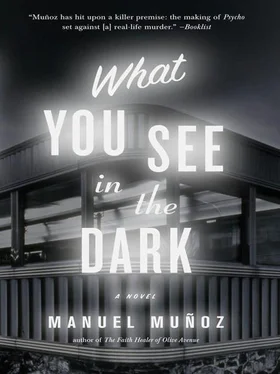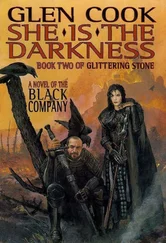But things change.
People forgot her mother. The name Alicia hardly danced anymore on the tip of anyone’s tongue. New waitresses came on board at the café, some from Stockton, some from little places like Delano or Tulare, knowing no one in town. People had other things they wanted to remember, like what the five-and-dime looked like before the TG&Y moved in. People even forgot the earthquake, the terror of the tumbling brick, and the railroad tracks just out of town bent into a slithery S. Teresa herself grew past eighteen, past twenty, and by the time she was twenty-three, not many thought it was unusual that she had her own job and lived in a small room above a bowling alley, her one little window with a dim yellow light glowing at dawn, sometimes the curl of a pale blue curtain fluttering past the open frame.
She felt sometimes, as she closed the green door behind her and began her walk to work, that people had forgotten all about her, that they’d not only forgotten about her mother but about how her mother had left and why, and once they’d forgotten that story, Teresa would also disappear, like a figure into fog.
She liked thinking of herself this way, as if it were one of those winter mornings when the Bakersfield streets clutched the fog deep into the asphalt and her own steps dissolved into all that white without a sound. What could people possibly know about her now? What could they say, when the years had eroded their concern and she walked with near anonymity along the streets of Bakersfield, no one wondering anymore just how she was going to take care of herself?
You have, her mother had said to her, a very good head on your shoulders.
She could do, she realized, whatever she wanted. She was twenty-three and her own woman.
When had this idea bloomed in front of her? On one of her walks to work, no doubt, all those mornings, five days a week, sometimes six, when she came down the narrow stairwell in whatever weather. Every day the same thing, the Mexican workers on the corner, the initial whistles, then the fervent admonishment from one of the men to settle down: Cheno remembered her mother. He used to buy a work lunch when Teresa’s mother sold bean tacos or ham tortas during the summer months, Teresa collecting the coins. He knew they should treat her respectfully. Cheno, who was a little shorter than the rest of the men, neither the oldest nor the youngest in the group, the one without tattoos, who knew how to keep his white shirts white, who endured the taunts from the men when he rushed to defend her. She knew he was standing a little apart from the men, as if to guard her as she walked along the block, as if waiting for her to come back. But of course, by the time she returned home from work at the shoe store, the men on the corner had already dispersed, some because they’d been picked up as extra hands in the fields, the rest because the police had chased them away for drinking beer, even if it was in a paper bag.
She thought of Cheno at lunchtime, when she took some of her hour to walk over to Stewart’s Appliances. The store, with its shiny radios and washers and sewing machines, was only for people with money. So Teresa stood outside the enormous store with its plate-glass windows reaching all the way to the sidewalk — built brand new and shatterproof after the earthquake — and watched the television sets, six of them playing without any sound. All six sets played a lunch-hour newscast, sometimes flashing pictures of the stark white regal domes and pillars of Washington, D.C., or some other faraway place, and Teresa patiently waited until it was over and the 12:30 musical show came on. A woman sang. Always a different woman, but always the same posture, the same stance — hips angled over to the side and arms straight down, her voice slowly rising to a crescendo Teresa could never hear from behind the window. She stood watching these soundless lunchtime concerts, and anyone watching her knew that she was dreaming beyond the desolation of Bakersfield’s dusty streets to a stage like the ones those women occupied, or to the theaters glimpsed by the audience when the cameras cut away to the interior: tiny round tables and elegant glasses, rows and rows of plush-looking seats. Velvet stage curtains and a spotlight like a tender moon, the full force of all manner of musical instruments, and men at the ready to play them: guitars, pianos, drums feathered gently, saxophones held to the lips with almost unbearable hesitation. Teresa daydreamed as the women sang because she couldn’t hear them through the glass. But she knew it would be over when the women’s arms finally reached outward to the camera, as if pleading, as if asking a lover back or sending him away, their mouths rounding out to release a last note held so impossibly long that Teresa thought she heard a glimmer of it through the thick plate-glass windows.
On afternoons in the dark quiet of the shoe store’s stockroom, she’d think of her mother boarding a bus and she would think of the hills south of Bakersfield and the pictures she saw of Los Angeles. Her mother had been heading to Texas, but Los Angeles would be the first city she would see, and Teresa wondered if her mother would be moved by the city’s pageantry and decide not to continue. You’ll understand one day, her mother had said, when you fall in love. Her mother’s words stayed with her for a long time, like the embraces of the chanteuses on her afternoon viewings, full of longing and never letting go. They filled Teresa with both hope and sadness: She understood, as she slid box after box onto the dusty shelves of the storeroom, that she had to fall in love first before she could be any of the women with the open arms. She understood, too, that this same hope and sadness led her imagination to put her mother back on the bus for the long hours to Texas, what she thought would be the hot, dusty sands of the Southwest before the bus stopped with a hiss and the door swung open for her mother’s release. Her mother with the open arms and someone there to receive them.
So when Cheno appeared one evening, the only person on the corner as she arrived home from work, she waited for him by the green door to her little room above the bowling alley. They stood there talking for a bit in Spanish and she asked him if he had worked that day. He said yes; she could tell that he was lying but she appreciated the effort that he had made, his plain white T-shirt tucked inside his pants, a faint hint of bleach carrying in the air, mixing with the Lucky Tiger oil he used to slick back his hair. Even the way he had hesitated in crossing the street charmed her a bit: tentative, looking at her as if awaiting a sign from a distant star.
They talked for no more than fifteen minutes, her hand on her purse even though there was nothing to guard except her key, and when he parted, Teresa knew he would be back the next day. She let herself in and climbed the stairs, immediately going to the window to peek out, just in time to see his form make its way down the street and finally turn a corner, heading west, walking all that way to the side of town where men lived too many to a house.
The next day, when the Mexican men on the corner watched her emerge, the usual taunts began. “¡Ay, mi amor!” “¿Adónde vas con mi corazón?” She walked on but cast a quick glance to see if Cheno was in the group, attempting to quiet them. He didn’t catch her looking for him, but she was heartened by the uninterrupted catcalling, certain that Cheno had done no bragging of his own. That evening he appeared at the corner with two lukewarm bottles of soda, which he uncapped against each other, and this was the start of his small, edible gifts: candy bars and fresh peaches and cans of Kern’s nectar and dried apricots and shelled walnuts packed into an empty Gerber baby-food jar.
Читать дальше












